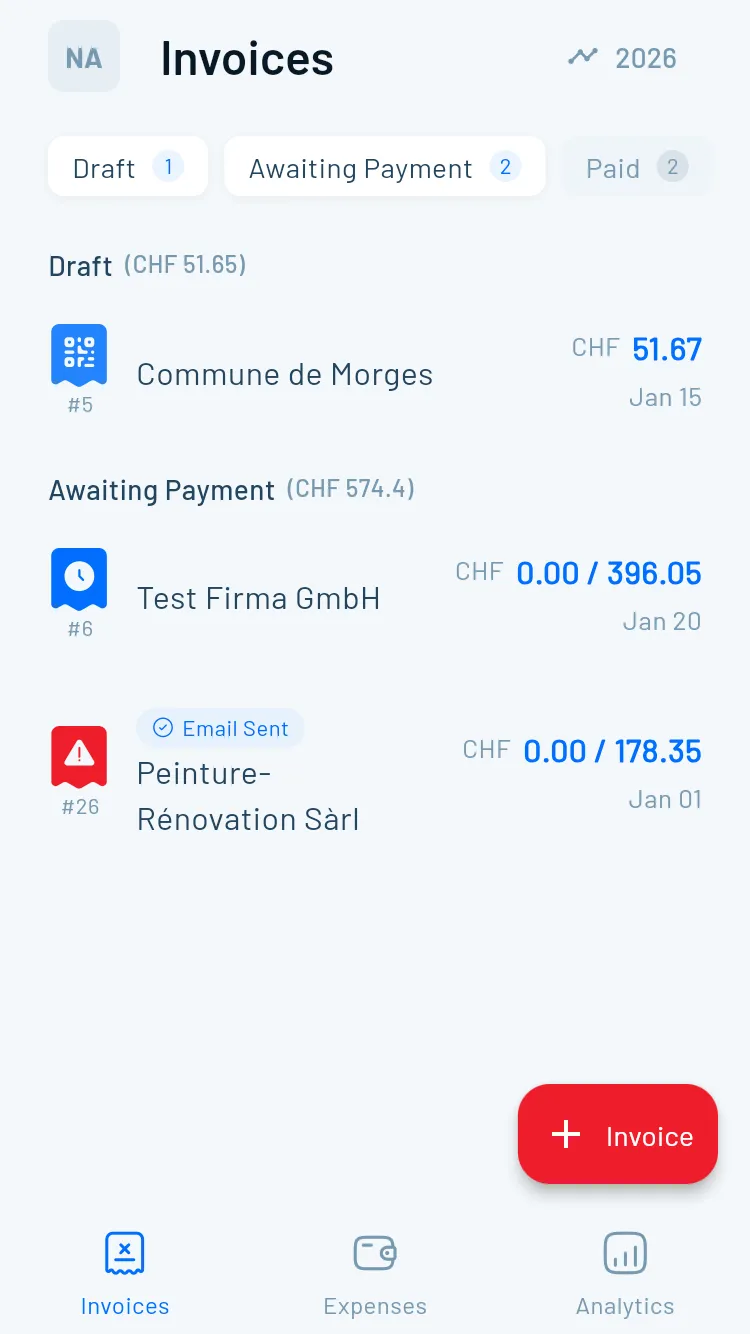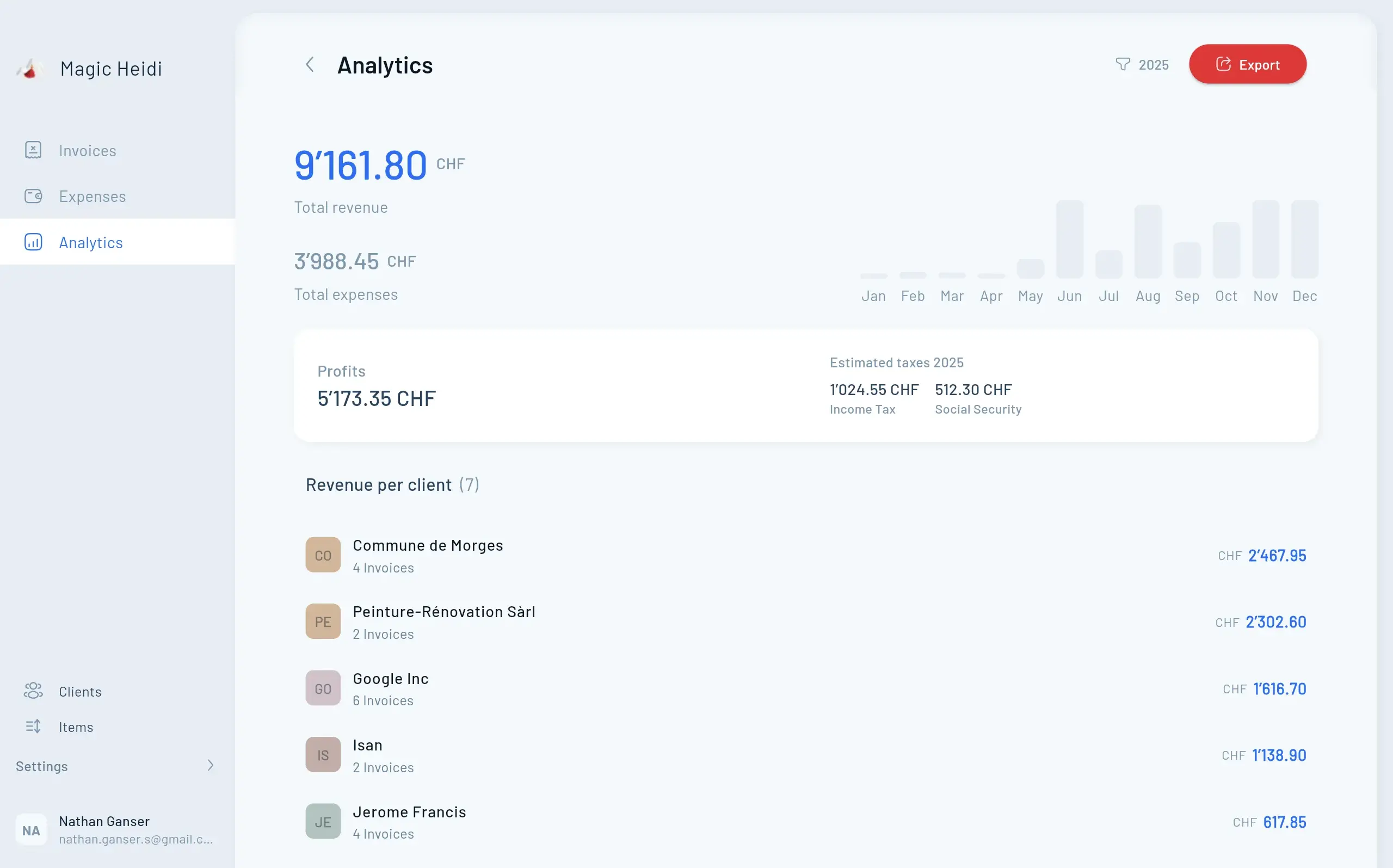Winbiz is cheaper than its competitors, and much easier to learn. Good solution for our startup.
Zürich
An honest, comprehensive review of Winbiz—covering features, pricing (CHF 69/mo), real user experiences, Swiss compliance, and better alternatives for freelancers and SMEs.

Choosing accounting software as a Swiss freelancer or small business owner shouldn't feel like a gamble. You need tools that handle Swiss VAT correctly, generate compliant invoices, and don't require an accounting degree to operate.
Winbiz has served Swiss SMEs for over 30 years, positioning itself as an all-in-one ERP solution. With 50,000+ customers and 900+ fiduciary partners, it's one of Switzerland's most established business management platforms.
But establishment doesn't always mean "best fit." This review cuts through the marketing to examine what Winbiz actually delivers—and more importantly, whether it matches your specific business needs.
Winbiz is a comprehensive business management suite developed specifically for the Swiss market. Founded in 1992 and based in Geneva, it's part of the Fiducial Group and offers modules for accounting, invoicing, payroll, inventory, and point-of-sale operations.
Unlike cloud-native platforms built for mobile-first users, Winbiz evolved from traditional Windows desktop software. The "cloud" version launched in 2019 uses Remote Desktop technology to deliver the same Windows interface through a browser—not a modern web application.
Key facts:
Most Swiss accounting solutions force you to choose between comprehensive features and ease of use. Winbiz is no exception—offering powerful capabilities wrapped in dated interfaces that demand significant learning time.
A comprehensive suite of business management tools designed for Swiss SMEs—though not all features may suit every business type.
Swiss OR-compliant general ledger and financial reporting
Swissdec-certified with all Swiss social insurance deductions
Stock management and retail point-of-sale systems
German, French, Italian, and English support
Magic Heidi
CHF 500
Jan 29
Webbiger LTD
CHF 2000
Jan 24
John Doe
CHF 600
Jan 20
Winbiz Cloud operates on a monthly subscription model:
Standard pricing:
Local version:
What's included:
What costs extra:
Winbiz sits in the mid-range for pricing but offers more comprehensive features than cheaper alternatives—at the cost of added complexity.
| Software | Starting Price | Best For |
|---|---|---|
| Winbiz Cloud | CHF 69/month | Growing SMEs with inventory |
| bexio | CHF 35/month | Service-based small businesses |
| CashCtrl | CHF 29/month | Cost-conscious freelancers |
| Magic Heidi | CHF 25/month | ✓ Simple freelancer workflows |
| Klara | CHF 49/month | Professional services firms |
| Crésus | CHF 350/year | Traditional businesses |
An honest assessment of what works and what doesn't.
Despite its limitations, Winbiz offers genuine strengths for certain business types.
Significant limitations that may be deal-breakers depending on your needs.
Honest feedback from Swiss business owners who've actually used Winbiz.
Winbiz is cheaper than its competitors, and much easier to learn. Good solution for our startup.
Zürich
I was seduced by their 'cloud' operation, without realizing it's complete virtualization on their premises. The Cloud has made basic things even more difficult—lags, unnecessary printing overlay, document export issues.
Geneva
Very obsolete interface. I have been using Winbiz since 2011 for accounting and payroll. The software has not changed much since then, which is a big reason for regret.
Lausanne
SAV et support inexistant, impossible d'avoir un support même en se collant au tél. Das System ist im Herbst 2022 für 2 Monate einfach ausgefallen.
Bern
Winbiz makes sense for specific business types—but not everyone.
Modern solutions built for today's freelancers and service businesses.
CHF 25/month—Purpose-built for Swiss freelancers wanting automation and minimal admin time.

CHF 35-115/month—Clean interface with good automation and room to grow.

CHF 29/month—True cloud-based with multi-client management and transparent pricing.

Winbiz takes data protection seriously:
Swiss FADP Compliance:
Security measures:
Swiss Made Certification: Verified by Swiss Label, confirming development and data hosting within Switzerland.
For businesses handling sensitive client data or subject to Swiss professional secrecy requirements, this local infrastructure matters.
Winbiz offers a trial period with 50% discount on the first three months. This gives you adequate time to evaluate whether the interface and workflow suit your needs.
Realistic timeline: Plan 4-8 hours for basic setup, longer if migrating historical data or requiring payroll configuration.
Warning: Based on user reviews, support responsiveness is questionable. Budget extra time for self-learning.
No. Despite the 'Cloud' branding, Winbiz uses Remote Desktop virtualization of Windows software, not a modern web application. This creates latency and limits mobile functionality.
Monthly subscriptions with 50% discount on first three months for new customers. No long-term contract required.
Yes, via browser for the cloud version, but the experience is optimized for Windows. Mobile apps offer limited functionality compared to desktop.
API availability is unclear. Some documentation mentions REST API for data import/export, but it's not a comprehensive integration platform. Verify current capabilities before committing if API access is critical.
Winbiz can import data from Excel, CSV, and some competitor formats. Complex migrations may require partner assistance. Historical data import quality varies depending on source format.
The 900+ fiduciary partner network is a genuine advantage. Your accountant can directly access your Winbiz account with appropriate permissions.
Yes. Data is stored in Swiss data centers with daily backups. Winbiz complies with Swiss FADP and GDPR requirements.
The standard subscription covers one company. Multiple entities require separate subscriptions or multi-client arrangements through fiduciary partners.
You can export your data before cancellation. Ensure you download all necessary reports and backups as access terminates at subscription end.
The software receives regular updates for tax rate changes and compliance requirements. Feature updates are less frequent—users note limited evolution since 2011.
Winbiz is a legitimate, comprehensive Swiss solution with genuine strengths for the right business type. It's not a scam, and it's not fundamentally bad software.
Choose Winbiz if:
Look elsewhere if:
The 50% trial discount gives you low-risk evaluation time. Use it to test the actual interface, not just read about features. What feels intuitive to one business owner might feel clunky to another.
Bottom line: Winbiz serves a specific market segment well—traditional SMEs with complex needs who prioritize comprehensiveness over modernity. For simple freelancer workflows, modern alternatives like Magic Heidi, bexio, or CashCtrl deliver better user experiences at similar or lower prices.
The best accounting software isn't the one with the most features or longest history. It's the one you'll actually use consistently without frustration.
Try Magic Heidi free for 30 days. Built specifically for Swiss freelancers who want simplicity, automation, and modern mobile-first design—not decades-old interfaces.